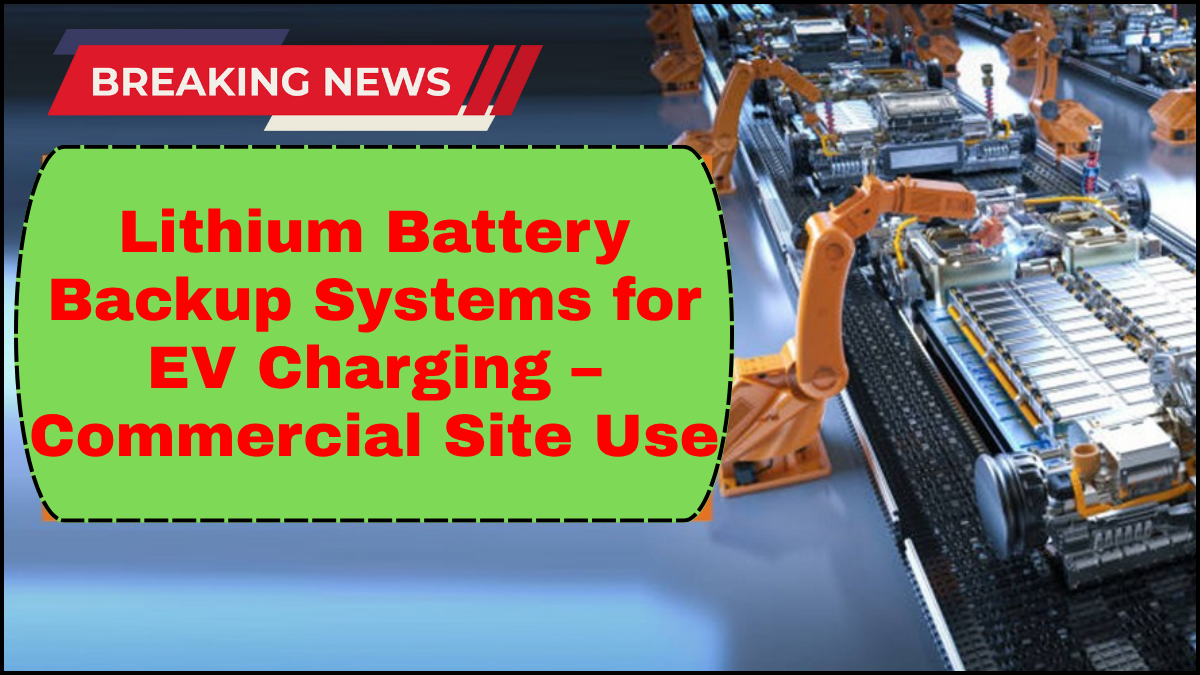As electric vehicle (EV) adoption accelerates, commercial sites are under increasing pressure to provide efficient, scalable, and uninterrupted charging infrastructure. One of the most effective ways to ensure this reliability is through lithium battery systems designed specifically for EV charging backup. These systems are redefining how businesses approach power storage, offering enhanced energy security, grid independence, and operational efficiency.

Why Commercial EV Charging Needs Backup Power
Commercial EV charging stations face unique challenges. They often serve multiple vehicles simultaneously, require consistent uptime, and must handle peak electricity demand without overloading the grid. Grid outages, voltage fluctuations, or infrastructure limitations can interrupt service, leading to dissatisfied customers and lost revenue.
That’s where lithium battery backup systems step in. They provide instant energy during outages or high-demand periods, ensuring that EV chargers remain operational regardless of external conditions. For fleet operators, retail locations, and public charging hubs, this means business continuity and customer satisfaction.
Advantages of Lithium Battery Systems Over Traditional Storage
Compared to lead-acid or other traditional batteries, lithium-ion technology offers clear advantages for commercial EV charging setups:
-
Higher Energy Density: Lithium batteries store more energy in less space, making them ideal for urban or space-limited installations.
-
Faster Charging and Discharging Rates: They can quickly respond to demand spikes or energy shortages.
-
Longer Life Cycle: Many lithium systems can last over 10 years with minimal degradation.
-
Low Maintenance: Unlike older technologies, lithium batteries require less upkeep, translating into lower operational costs.
-
Scalability: Easily expandable to meet growing energy demands as EV usage increases.
Key Applications at Commercial Sites
1. Load Management and Peak Shaving
During peak hours, utility rates can surge. Lithium battery systems can discharge stored power during these times, reducing reliance on expensive grid energy. This helps commercial operators manage costs while ensuring chargers operate without disruption.
2. Grid Stabilization and Demand Response
By integrating smart battery management systems, commercial EV sites can participate in grid demand response programs. They can supply stored energy back to the grid when needed, creating a two-way value stream.
3. Resilience Against Power Outages
Backup battery systems ensure that EV chargers remain active during blackouts. For businesses that rely on electric fleet vehicles—such as logistics hubs, last-mile delivery services, or public transit depots—this resilience is critical.
4. Support for Renewable Energy Integration
Combining solar panels with lithium battery systems enables a commercial site to generate and store clean energy on-site. This reduces carbon footprint and enhances grid independence while aligning with sustainability goals.
Choosing the Right Lithium Battery System
When selecting a lithium battery backup for EV charging, businesses should consider:
-
Capacity Requirements: Calculate peak and average energy demands.
-
Battery Chemistry: Lithium Iron Phosphate (LiFePO4) is favored for its safety and longevity in stationary applications.
-
Installation Footprint: Evaluate space availability and potential for expansion.
-
Integration Compatibility: Ensure compatibility with existing EVSE (Electric Vehicle Supply Equipment) and energy management platforms.
-
Warranty and Support: Opt for providers offering comprehensive warranties and service packages.
Real-World Example: Urban Charging Hub
A large retail complex in a metropolitan area recently integrated a 500 kWh lithium battery system to support 20 Level 3 DC fast chargers. The system not only provides backup power during outages but also reduces grid draw during the evening peak. Over the first year, the complex reported a 28% reduction in energy costs and improved customer satisfaction scores due to uninterrupted charging availability.
Frequently Asked Questions
Q1: How long can a lithium battery system power EV chargers during a blackout?
A: It depends on the battery’s capacity and the number of chargers. For instance, a 250 kWh battery could support several Level 2 chargers for a few hours or sustain fast chargers for a shorter period.
Q2: Are lithium battery systems safe for commercial use?
A: Yes. Modern lithium systems, especially those using LiFePO4 chemistry, are designed with advanced thermal management and safety mechanisms, making them highly reliable for commercial applications.
Q3: Can lithium batteries be used with solar panels at commercial EV sites?
A: Absolutely. Pairing lithium batteries with solar power enhances energy autonomy and allows businesses to store excess solar energy for later use, improving ROI on renewable investments.
Q4: What is the ROI timeline for installing lithium battery systems?
A: Most businesses see ROI within 3–7 years, depending on energy rates, usage patterns, and incentives. Load reduction, demand charge savings, and improved uptime contribute significantly to payback.
Q5: Do lithium battery systems require regular maintenance?
A: Minimal maintenance is needed compared to traditional battery systems. Regular software updates and system checks are generally sufficient to ensure optimal performance.
click here to learn more



